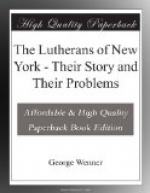To minister as we should to such a constituency, we need co-operation in place of competition. The work of cultivating effectively such a field can never be done by churches so hopelessly divided as ours.
Other churches, Protestant and Catholic, with a centralized ecclesiastical organization, are able to work together as one body and make plans for their work covering the entire Metropolitan District. We, with our strong individualism, cannot vie with them. In our polity we are extreme congregationalists and must pay for our freedom.
But there is much that our churches have in common. Our flocks are not alienated from each other as much as are the shepherds. The formation of local groups throughout the greater city, co-operating in common causes, or at least refraining from a polemical policy, would pave the way for a better understanding of our mutual needs and opportunities for service.
Three things, at least, might be done without compromising the faith or violating the spirit of our church life:
1. We might meet for the purpose of forming each other’s acquaintance and for the discussion of practical questions. Perhaps none of us is quite so heretical as the synodical divergence would lead a layman to suppose.
2. We might meet for the discussion of vital questions of religion and morals. It is one thing to read about these things in books. It is quite another thing to listen to a spoken presentation warm with the sympathy of a living experience.
3. We might recognize each other’s spheres of influence and federate our forces in meeting the needs of our vast community.
In the meantime we are slowly learning that the aspirations and convictions that unite us are greater than the things that separate us. The clearer comprehension of the principles we hold and of the work we have to do, and the sense of our responsibility as one of the larger communions of the metropolis, compel us more and more to emphasize not the unessential details of our theological system but rather the larger truths and principles for which we stand and which we hold in common.
A hundred years ago, on the tercentenary of the Reformation, after a period of political humiliation and economic distress in the Fatherland, the Ninety-five Theses of Claus Harms sounded a call for a Lutheran awakening throughout the world. The result of that revival is felt in the churches to this day.
The quadricentenary of the Reformation was celebrated
amid the convulsions of a World War. Is it too
much to hope that after this war also the ground may
be prepared for a spiritual sowing and reaping when
the unnecessary dissensions of sectarian controversy
will give place to fraternal co-operation in the service
of a common Lord and in the promotion of a common
faith?*
Since the foregoing
paragraphs were written an unexpected change
in the outlook has taken place. Steps were taken




